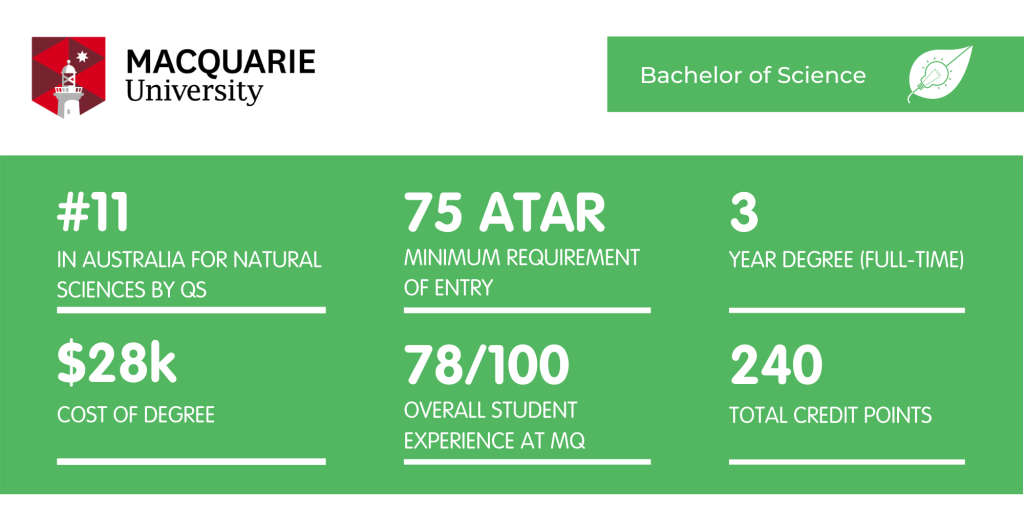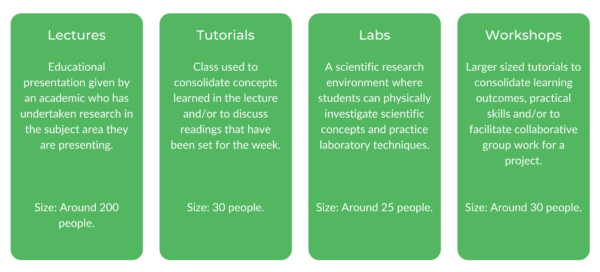Are you wanting to study a Bachelor of Science at MQ Uni, but you have no idea where to start?
We can help — we’ve compiled everything you need to know and more about this degree.
Check it out below!
What is a Bachelor of Science at MQ Uni?
Core Units and Majors
How to Get into a Bachelor of Science at MQ Uni
What’s the Teaching Format?
What’s the Faculty and Culture Like?
What is a Bachelor of Science at MQ Uni?
The Bachelor of Science at MQ Uni is a degree that can take many forms and paths — there are many different majors and disciplines students can choose. From Biology to Chemistry, students have quite the selection when it comes to what they’d like to specialise in.
Students will be taught across a range of different methods and teaching styles, with both practical and theoretical elements mixed in. Taking on a Bachelor of Science means having the chance to conduct experiments in labs and document scientific reports.
Can this degree be studied in conjunction with another?
Science at MQ can be studied as a double degree meaning that with some extra time, students with this degree structure will graduate with two undergraduate degrees and qualifications! There are advantages to graduating with a double degree, such as developing skills in another discipline and having an edge over others when applying for jobs.
Popular double degree additions to the Bachelor of Science at MQ Uni include:
Career Paths
There are many different places and industries in which Science graduates can work, especially with this degree and its specifications giving students versatility and the ability to multi-skill! Future places of employment could include:
-
- Agricultural agencies
- Banks and financial institutions
- Consultancy firms
- Environment protection authorities
- Exploration and mining industries
- Government departments
- Hospitals
- IT companies
- Medical research centres (especially laboratories)
- National parks and conservation agencies
- Research institutions
- Telecommunication companies
Core Units and Majors
What are the Majors?
There are a large variety of majors that can be decided upon. Each major gives students a chance to explore their interests in-depth and excel in their chosen field!
Some of the majors are:
| Major | Description |
|---|---|
| Astronomy and Astrophysics | Students who take this major will be able to apply their mathematical skills and develop their scientific knowledge with a focus on the world beyond our planet! |
| Biology | Biology majors will know all about the function of key biological units by the time their degree is finished. This major has a focus on our living and breathing world. |
| Biomolecular Sciences | This major has a focus on both the practical and theoretical aspects of this science. Students will be proficient in asking the real questions with a scope within biomolecular sciences. |
| Chemistry | Chemistry majors will learn how to question things, and completely change their ideals and point of view very quickly! Through experimentation and relation to theory, MQU produces some pretty awesome chemistry grads. |
What are the Core Units?
Core units within the Bachelor of Science at MQ will largely depend on your chosen specialisation. This allows you to get a real taste of your desired major discipline, as well as other general science units.
For example, if you choose to major in Chemistry, the subjects you are required to take may include:
While there are units that are compulsory for students to take dependent on their major, there are quite a few options sets that students can choose from to give them a bit of flexibility with their major.
These are some units you may end up getting to choose from for your option sets:
Statistical Concepts for Science – This unit delves into the world of data processing and statistics! This unit will give students an understanding of data collection, data models and statistical models within a scientific context.
Scientific Computing – This unit introduces students to the link between science and computing — this is done through the implementation of data and how to manipulate it!
Electives
There is also space for students to pick electives or take on a minor! Students will have 80 credit points delegated to them to complete either a minor or delve into electives of other disciplines at Macquarie Uni.
Internships
Within the Bachelor of Science at MQ Uni, it is not compulsory to complete an aspect of an internship or work placement, however, it is highly encouraged! Macquarie Uni runs PACE units tailored to each major and discipline, focused on Professional and Community Engagement.
Through these units, students gain worthwhile industry experience within their field of study! So if you want to use your elective spaces towards a subject that is beneficial and looks great on your resume, consider taking a PACE unit.
Within the final year of studying the Bachelor of Science at Macquarie Uni, students will undertake a capstone unit. This unit allows students to develop their presentation skills (which are much needed in the industry), through completing a project pitch!
How to Get into a Bachelor of Science at MQ Uni
To gain guaranteed entry into the Bachelor of Science at MQ Uni you will need to get an ATAR of 75 or above. However, if you did not achieve this ATAR, there is another method to gain admission into this degree!
Internal Transfer
You can always enrol into a degree that requires a lower ATAR and after a minimum of 6 months, if you’ve managed to maintain an adequate WAM, you may transfer into a Bachelor of Science. You may even study units towards the Bachelor of Science in your initial degree’s elective spaces so that you’re already completing the requirements for your desired qualification.
Scholarships
Macquarie University hosts a large variety of scholarships, rewarding academic excellence, providing scholarships based on equity and more! To see if you qualify from any, check out the Scholarships Search here!
What’s the Teaching Format?
At Macquarie Uni, the years of study are structured across semesters. This means that teaching periods are held over two different academic sessions each year with breaks in between!
Class Structure
The teaching format for the Bachelor of Science at Macquarie University varies from subject to subject, but students can typically expect:
Lectures
Lectures have a large number of students, approximately anywhere up to 200 and the professor shares new ideas, models, concepts and theories. These classes run for two hours and aren’t super interactive but it’s important to pay attention as this content will inform tutorials that follow.
Tutorials
The tutorial setting is a lot more relaxed, with a class of 30 students having the opportunity to collaborate on tasks, ask questions and have class discussions — these usually run for 1-2 hours!
Labs
Labs are practical classes that highly focus on experiments, group tasks and just testing things out physically! A lab can go anywhere from 1 and a half hours to 3, with usually no more than 25 students!
Workshops
A workshop combines the principles of the lecture and tutorial into one class! With a class of about 30 people, for 1-3 hours, the tutor will cover topics while also assigning work to be completed over the class time, with potentially new models or theories being applied within that class.
How much time do you spend on campus?
Generally, students will have four subjects to study per semester for a Macquarie University Science degree on a full-time load. This means the contact hours for this subject will be up to 20 plus hours per week!
By the end of the degree, you will become close with your cohort from seeing them so regularly.
Assessments
The range of ways students are assessed within this degree is as diverse as the subjects themselves! In saying this, you will most likely either have a midterm exam or final exam for any of your given units.
Students will also complete group tasks such as article reviews, experiments and presentations! Additionally, they will be assessed through the practical aspects of their learning, this means that students can be assessed though their labs and practical classes on experiments and more.
Skills That You Refine and Learn
Within the Bachelor of Science at MQ Uni, a multitude of different skills and attributes are learned and refined! Students will first and foremost gain the ability to think critically — which could be developed through students creating their own hypotheses, analysing results and critically analysing other scientists’ research reports.
Science students will also gain a valuable amount of real-world experience through collaboration with other students! Not only do they develop their practical abilities, but their research and theory-related skills will grow as well.
What’s the Faculty and Culture like?
The Bachelor of Science at MQ Uni is a part of the large Faculty of Science and Engineering and hosts some of the most dedicated and interested teachers! This feeling is echoed by the students who have been described as warm and inviting!
Societies and Clubs
Macquarie Uni is home to a huge range of different societies and clubs — you can have a look at them all here! However, here are some relevant to The Bachelor of Science:
Biology and Environment Society — This group caters to students studying a biology or earth and environmental major, but also any MQU student who is interested in our planet! This group hosts events, social gatherings, information nights and also promotes internship and work placement opportunities.
Physics and Astronomy Society — This society is relevant to both Astronomy and Physics majors! Students are provided with a network of like-minded people, connections to industry professionals and fun nights out and about!
Mentorship Program
Macquarie University also runs a first-year mentee program; the Macquarie University Peer Mentors help first-year students to settle into university life and study! This program takes away any animosity students may have and creates a safe space for students to ask questions, find like-minded people and foster a welcoming entry into uni.
Interested in the pros and cons of this degree? Check out our article here!
Matilda Elliott is a Content Writer at Art of Smart and a Communication graduate with a major in Journalism at Western Sydney University. You can find some of her published work in a range of platforms including SBS World News, The Music Network and within her own creative exploits with her twin sister. Matilda is a lover of listening, helping people to tell their stories, making genuine connections, clowning around in her circus troupe and dancing like no one is watching at live music shows!






